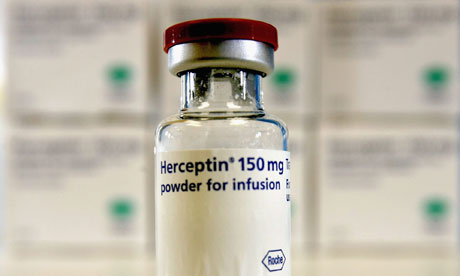
Breast cancer is a global problem – 1.4 million women worldwide are diagnosed each year. Almost 50,000 of them live here in the UK. But thanks to improvements in care, it's also a success story. Eight out of 10 women now survive for five years or more following a diagnosis of breast cancer, compared with just five out of 10 a few decades ago.
Scientific research has been at the heart of this progress, and much of this improved survival is due to drugs that have emerged from laboratories worldwide. Hormone drugs like tamoxifen, and targeted treatments like trastuzumab (better known as Herceptin), have saved thousands of lives.
At Cancer Research UK we're proud to have supported the clinical work that refined tamoxifen use, and the laboratory work in the 1980s that ultimately led to the development of Herceptin.
However, these drugs don't work for some women: their tumours lack the molecules that make them susceptible. And others, whose tumours look like they should respond, don't – and we don't know why.
Clearly, our classification of breast cancers as hormone-positive or negative, and Her2-positive or negative, is far too simplistic.
Which brings us to today's landmark announcement. Our researchers, working with colleagues in Canada, have completely redefined breast cancer into 10 entirely new categories. To achieve this, the METABRIC team, led jointly by Prof Carlos Caldas from Cancer Research UK's Cambridge Research Institute and Prof Sam Aparicio from the British Columbia Cancer Centre in Canada, analysed tumours from nearly 2,000 women.
What makes METABRIC such a game changer is that they analysed so many different aspects of the tumours – gene mutations, gene amplifications, gene activity and more – and linked this information to the women's treatment history, and their clinical fates. This is the first study of this level of detail and scale in the world.
What do the results mean?
First, they confirm that our existing "breast cancer map" is outdated – there should be 10 "countries", not four "continents" – and this is now territory we need to urgently explore. For example, one of the newly discovered types consisted of women with apparently aggressive cancers who actually did very well. Closer inspection showed that these women were rescued by their own immune systems. We urgently need to know how.
Second, the study identified a slew of new cancer genes, which will make excellent targets for a new generation of Herceptin-like drugs. We hope that, one day, drugs will exist for all these subgroups, so no woman will ever have to be told she has the "wrong" type of breast cancer.
And finally, the results suggest that some women have such a good prognosis that they could potentially be spared chemotherapy after their surgery.
But all of this needs more research and follow-up so we can be absolutely sure we're giving the best treatment to the right women.
We're already designing trials to test some of these ideas, but it will be several years before they are turned into reality and become part of routine care within the NHS.
Cancer Research UK is immensely proud to have funded this landmark study, and we're hugely grateful to all of the supporters who made it possible.
Dr Harpal Kumar is chief executive of Cancer Research UK. Read more about this research on CRUK's science blog

